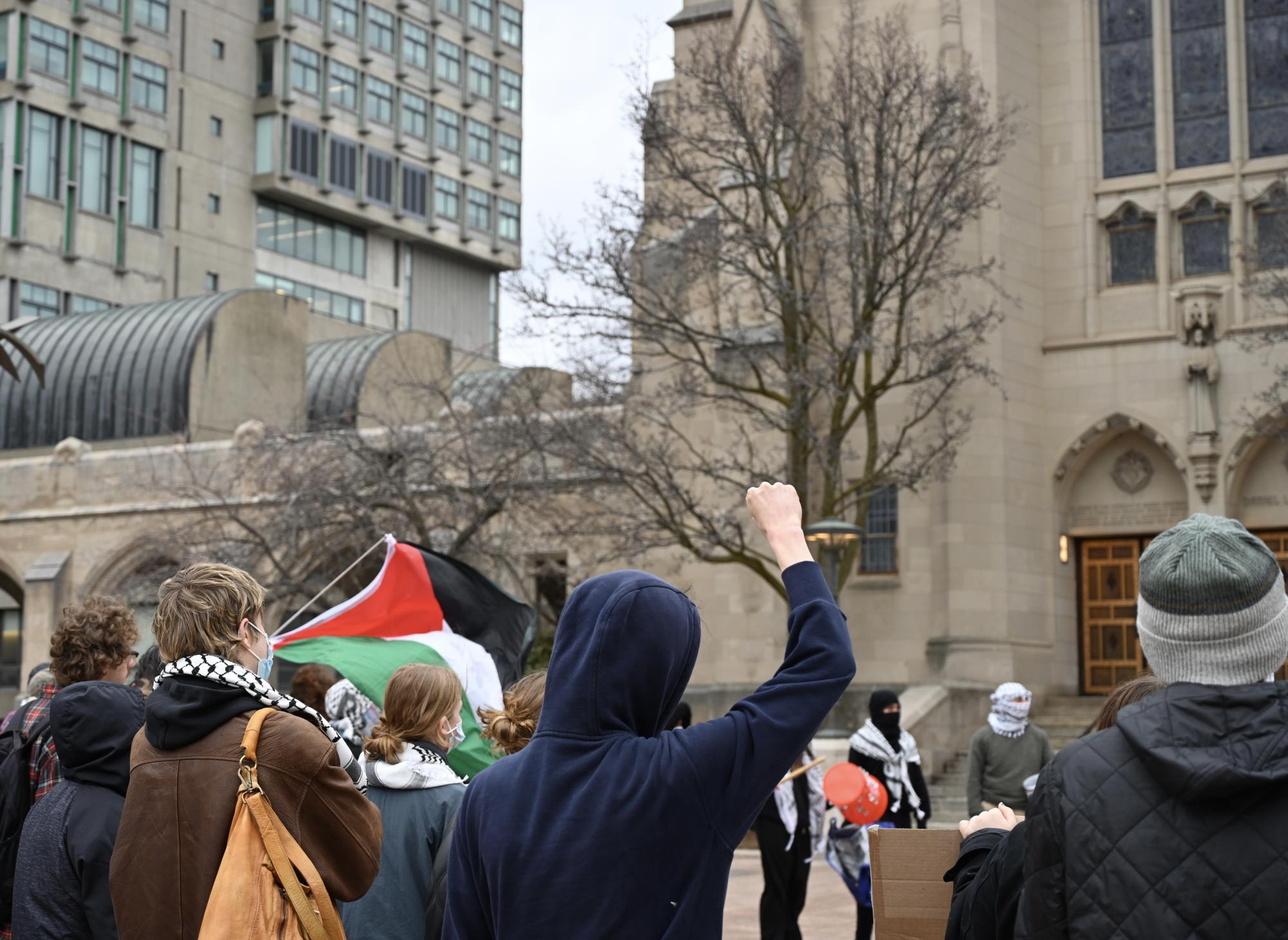Boston University Students for Justice in Palestine and the University’s chapter of Young Democratic Socialists of America faced disciplinary action from the Student Activities Office this spring semester.

These actions restricted the groups’ activism and forced them to either pause their efforts or find alternative ways to organize.
SPJ disaffiliated with BU shortly after SAO placed the group on probation in March. The probation stemmed from SJP posting flyers demanding BU to divest from Israel and hanging a banner outside of the College of Arts and Sciences. Both actions violated the University’s Publications and Publicity Policy.
Senior Mary Haddad, a former member of SJP, said the group has “continuously” faced disciplinary action from SAO in the past, including a formal warning following a series of “study-in” demonstrations in November 2024.
“It’s typical of them to try and silence us,” she said. “I was not surprised.”
After an emergency rally organized by SJP on March 5 at Marsh Plaza — just two days after the group was placed on probation — the organization experienced increased policing that made it “incredibly difficult to function under the University,” Haddad said.
The University’s probationary measures restricted SJP’s ability to reserve tables at the George Sherman Union or other spaces to meet on campus without clearance from SAO. They also required SJP to send 10 members to an “SAO-sponsored training.”
“It’s a way to avoid putting us on suspension, like they did [with] YDSA,” Haddad said.
Haddad said SJP leaders chose to disaffiliate with BU because the group was “constantly being surveilled.”
“Everything we did was being watched and responded to by SAO and everyone was really tired,” Haddad said. “They did a good job at pushing us out.”
BU Spokesperson Colin Riley said SJP “voluntarily disbanded” the organization.
The group was renamed the Quinobequin Student Front For Palestine after disaffiliating from BU and continues to practice student activism, Haddad said.
While Haddad is not currently a member, she said QSFP “will continue to fight for divestment,” despite no longer being able to operate on campus.
“Pulling out as a club does not erase the people that were originally a part of it,” Haddad said. “The activism will continue whether it’s with SJP or not.”
YDSA was suspended in April by SAO for postering and organizing a sit-in at the Dean of Students’ office, urging BU to declare itself a sanctuary campus. Unlike the SJP probation, the YDSA suspension fully bars the group from operating on campus until December.
In an April 12 Instagram post, YDSA wrote the suspension was issued “because of [their] vocal opposition to the University.”
However, Riley said YDSA’s suspension was in response to “documented violations of University policies,” including posting unauthorized materials on campus. YDSA leadership was informed of these violations in a meeting with BU administration, he said.
“We don’t punish students for viewpoints. It’s just a response to violations of time, place and manner policies, and that applies to all student groups,” Riley said.
All posters and flyers must be placed only on “authorized bulletin boards” or “free expression boards,” according to SAO guidelines on postering. These materials cannot be placed on “walls, doors, windows, or trees and may not be attached with permanent adhesives.”
Riley said these rules are meant to prevent littering on campus.
Haddad said while posters are effective in spreading information, there are “limited locations” where posters are permitted.
“It’s really another way for BU to limit the information that reaches students,” she said.
Tony Wu, vice president of BU Student Government, said he is advocating for YDSA’s reinstatement on campus through conversations with the Dean of Students and SAO.
“As a university, we can do better in terms of how we can better support student activism and such critical work on campus,” Wu said.
Wu said while YDSA and SJP violated SAO guidelines, he does not believe the probation or suspension was justified, as the “nature of their work involves civil disobedience.” The actions taken against the organizations by the University are a “violation of their rights,” he said.
“There must be a path forward that does not involve suspension because it’s really about the fundamental freedoms to speech and assembly,” Wu said. “We cannot understate just how impactful these suspensions may be to students on campus who may now feel even more unprotected or unheard given the recent political climate that we live in.”
Senior Stephanie Donahoe, president of BU’s Mixed Student Union, a discussion-based space for students with multiple cultures or ethnicities, said she finds the disciplinary action taken against these clubs to be “belittling.”
“We deserve, as students, to feel safe, to feel heard, to feel protected and to be able to ask more from our universities in our country,” she said.























































































































